unit9
人教版(新目标)初中英语九年级下册Unit 9 自学知识点
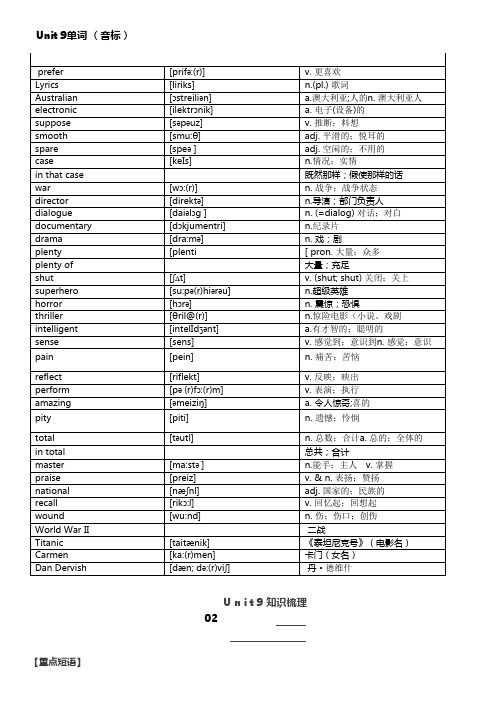
Unit 9单词(音标)U n i t 9 知识梳理02【重点短语】1.dance to (music) 随着(音乐)跳舞2.sing along with 随着…一起唱3.musicians who play different kinds of music弹奏不同类型音乐的音乐家4.electronic music 电子音乐5.not much 没什么(事)6.suppose sb to do sth. 猜想某人做某事7.be supposed to do sth 应该做某事8.suppose sb (to be) +adj. 原以为…9.have spare time 有空闲时间10.in one’s spare time在某人的空闲时间11.spare the time to do sth 抽时间做…12.a film director 一名电影导演13.think too much 想太多14.in that case 既然那样15.World War II 第二次世界大战16.smooth music 悦耳的音乐17.prefer A to B 比起B来更喜欢A18.prefer doing A to doing B19.prefer to do sth. rather than do sth.20.feel like doing sth 想要做某事21.stick to 坚持,固守22.be down 悲哀,沮丧23.cheer sb up 使… 高兴/ 振奋24.have a happy ending 有个美满的结局25.try one’s best to do sth. 尽某人最大努力做…26.less serious 不那么严重27.a good way to do sth 做某事的好办法28.make me feel even sadder 让我感觉更伤心29.provide plenty of information about a certain subject 提供了大量的关于某个主题的信息30.shut off my brain 关闭我的大脑【重点句型】1.I love singers who write their own music.我喜欢自己创作曲子的歌手。
Unit 9 单元复习知识点课件 人教版英语七年级下册

-- _________.
A. He is thin
B. She is a kind girl
C. She likes music D. She has good-looking
4. -- Lucy doesn’t have curly hair.
-- Yes, we can say she has _______hair.
There are a lot of people in the bus. 公共汽车上有很多人。
3. Also, they don’t always remember well. 而且,他们并不总是记得牢靠。
(1)当also用于句首时,其后往往有逗号与句 子的剩余部分隔开。这时,also用于修饰整 个句子,相当于汉语中“同时;还;而且”。
Unit 9 What does he look like?
单元复习知识点课件
Key sentences for describing people: (描述人的重点句型)
What does he/she look like? 1) He/She is of medium height/tall/short
A. How old is he
B. What does he do
C. What does he look like D. How is he
8. --Tom is not very heavy.
--Yes, I think we can say he is ______ heavy.
A. a little
Ⅰ.补全句子。
1. 他长得什么样?
_W___h_a_t_ __d_o_e_s__ he ___lo_o__k_ __l_ik__e__?
Unit 9【复习课件】八年级英语上册单元复习(人教版)
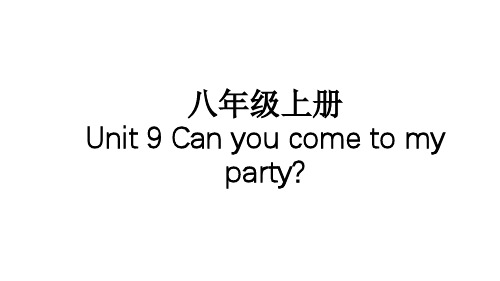
---____C_a_n__y_o_u__c_o_m__e_t_o_m_?y house on Sunday?
---____S__o_r_r_y_,_I’_m__n__o_t_a_v_a_i_la_b_l_e_._I_h_a?ve too much homework.
invitation /ˌɪnvɪ'teɪʃn/ n.邀请;请柬 turn down拒绝 reply /rɪ'plaɪ/ v.回答,回复 forward/'fɔː(r)wə(r)d/ v. 转交;发送,adv.向前,前进 delete /dɪ'liːt/ v.删除 print/prɪnt/ v.打印;印刷 sad /sæd/ adj.(令人)悲哀的/(令人)难过的 goodbye/ˌɡʊd'baɪ/ interj.&n.再见 take a trip去旅行 glad /ɡlæd/ adj.高兴;愿意 help out(帮助……)分担工作、解决难题 preparation /ˌprepə'reɪʃn/ n.准备,准备工作 glue /gluː/ n.胶水 without /wɪ'ðaʊt/prep.没有/不(做某事) surprised /sə(r) 'paɪzd/adj.惊奇的/感觉意外的
表推测
can’t 表不可能 could不确定推测
The red hat can’t be his, because his is black. He won’t do this. It could be wrong.
may表请求
语气委婉礼 貌
回答用 may/can
May I sit here?
最新人教版新目标九年级英语Unit9单元教案教学设计(含全单元知识点)
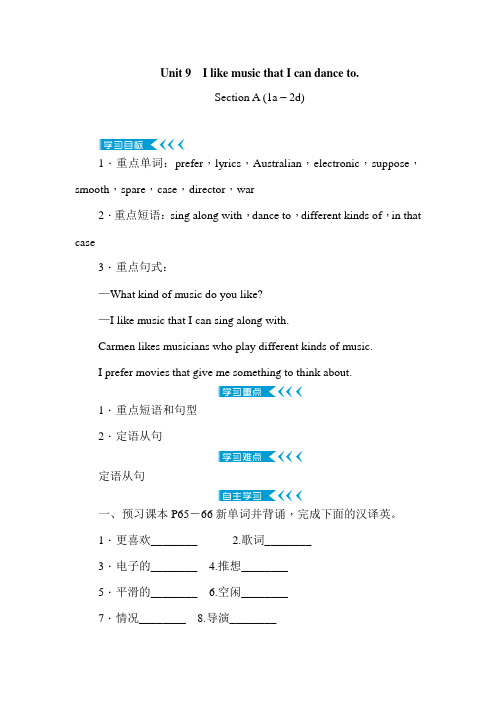
Unit 9I like music that I can dance to.Section A (1a-2d)1.重点单词:prefer,lyrics,Australian,electronic,suppose,smooth,spare,case,director,war2.重点短语:sing along with,dance to,different kinds of,in that case3.重点句式:—What kind of music do you like?—I like music that I can sing along with.Carmen likes musicians who play different kinds of music.I prefer movies that give me something to think about.1.重点短语和句型2.定语从句定语从句一、预习课本P65-66新单词并背诵,完成下面的汉译英。
1.更喜欢________ 2.歌词________3.电子的________ 4.推想________5.平滑的________ 6.空闲________7.情况________ 8.导演________9.战争________ 10.澳大利亚的________二、认真预习1a-2d找出下列短语和句型。
1.随之唱歌________________________________________________________ ________________2.随着……跳舞________________________________________________________ ________________3.不同种类的________________________________________________________ ________________4.既然那样________________________________________________________ ________________5.—你喜欢什么种类的音乐?—我喜欢能跟着唱的音乐。
2024年人教版九年级英语上册 Unit 9
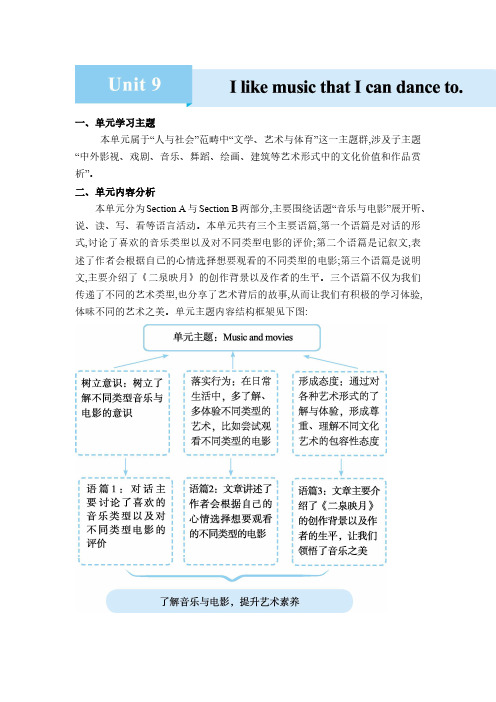
一、单元学习主题
本单元属于“人与社会”范畴中“文学、艺术与体育”这一主题群,涉及子主题“中外影视、戏剧、音乐、舞蹈、绘画、建筑等艺术形式中的文化价值和作品赏析”。
二、单元内容分析
本单元分为Section A与Section B两部分,主要围绕话题“音乐与电影”展开听、说、读、写、看等语言活动。
本单元共有三个主要语篇,第一个语篇是对话的形式,讨论了喜欢的音乐类型以及对不同类型电影的评价;第二个语篇是记叙文,表述了作者会根据自己的心情选择想要观看的不同类型的电影;第三个语篇是说明文,主要介绍了《二泉映月》的创作背景以及作者的生平。
三个语篇不仅为我们传递了不同的艺术类型,也分享了艺术背后的故事,从而让我们有积极的学习体验,体味不同的艺术之美。
单元主题内容结构框架见下图:。
人教版九年级英语全册Unit 9 精品课件

√B. It is sad but beautiful.
√ 3. From the passage we have learnt that Abing has a hard life except____.
A.His father died when he was a baby.
B.He was poor and homeless.
Abing
his mother died… his father died… became blind… had no home… lived on the streets… played music to make money… got married… continued to sing and play…
Paragraph 1
Supporting details
◆ The music was strangely beautiful, but under the beauty I sensed a strong sadness and pain. ◆ It was one of the most moving pieces of music that I’ve ever heard. ◆ I almost cried along with it as I listened.
n. 大师; 能手; 主人 v. 掌握
v. & n. 表扬; 赞扬
v. 使(身体)受伤; 伤害 n. 伤; 伤口; 创作
v. 回忆起; 回想起
adj. 令人痛苦的; 令人疼痛的
Careful Reading1
1.What is the name of Abing's most famous piece of music?
初三英语(全一册)Unit 9生词和练习
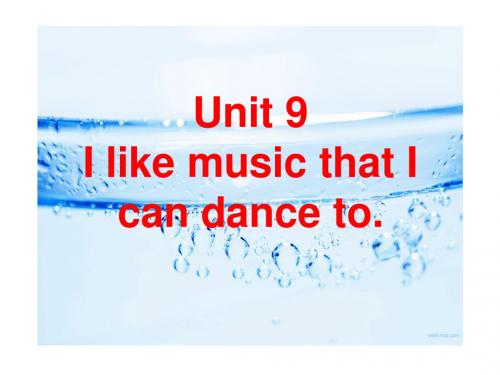
exercises
单项选择 1. His father was dead, and he could not get away from his ____ . A. loneliness B. sadness C. inspiration D. wound 2. Emily preferred ____ TV at home to ____ to the party. A. to watch; go B. watching; going C. watching; go D. to watch; going 3. I don’t know if Mr. Smith shut ____ the windows before he left the workshop. A. off B. down C. up D. on 4. ____ the name suggests, the city is very beautiful. A. As B. For C. With D. At
5. —It’s necessary for us ____ a balanced diet. —I agree with you. A. have B. to have C. having D. has 6. The food tastes ____ . I want to eat more. A. well B. bad C. badly D. good 7. —What kind of teachers do you like? — ____ . A. I like my English teacher B. I like those who are friendly C. The teacher is outgoing D. The teacher is strict with me 8. My mother likes soft and gentle music. She says it ____ very nice. A. tastes B. looks C. sounds D. feels
Unit 9 单词讲解 -人教版九年级英语
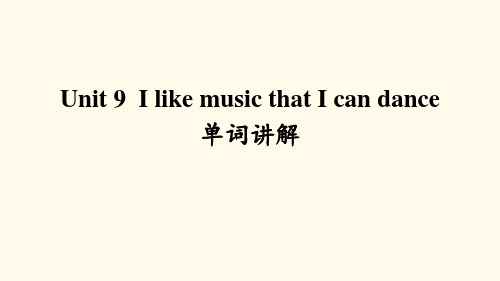
构成:
plenty
plenty of 大量;充足 (既可以 修饰可数名词,又可以修饰不可
[ˈplentɪ]
数名词,相当于lots of或 a lot of
),常用于肯定句中
pron. 大量;众多
例句:
In the summer,plenty of tourist
from all over the world come
down
[daʊn]
adj. 悲哀的;沮丧的 adv./prep.沿着
拓展:
let down 使...失望 put down 放下 cut down 砍倒 slow down 减缓;放慢 sit down 坐下 write down 写下 turn down 把声音调小
ending
[ˈendɪŋ]
case
[keɪs]
n. 情况;实情 ; 箱子
搭配: in case 后接从句;“以防;万一” in case of +单词“若某事发生;假如” in that case 既然那样;假使那样的话 in this case 在这种情况下 in any case 无论如何;不管怎样
例句: In that case, I won’t take that job.
pity
拓展: pity, shame “可惜
[ˈpɪti]
n. 遗憾;怜悯;
1.两者均可表示“遗憾的事”, 可以换用 2.shame还可以表示“可耻之事;
同情;可惜的事; 憾事
令人难堪的事”,指说话人对某
种行为感到厌烦,憎恶或讨厌; 而pity没有这一意思。 3.It is a pity that +从句 “真遗 憾......” What a pity! 真可以
- 1、下载文档前请自行甄别文档内容的完整性,平台不提供额外的编辑、内容补充、找答案等附加服务。
- 2、"仅部分预览"的文档,不可在线预览部分如存在完整性等问题,可反馈申请退款(可完整预览的文档不适用该条件!)。
- 3、如文档侵犯您的权益,请联系客服反馈,我们会尽快为您处理(人工客服工作时间:9:00-18:30)。
comedies action movies 2 documentaries 4 thrillers
Fill in the blanks
Ben: Do you want to go to an action movie? Sally: No. Ben:
I don’t like action movies.
Do pair work as the sample, using the following pictures:
What kind of movies do you like?
I like action movies and comedies.
singular
comedy
plural
comedies
★
“Section B”具体让学生来描述不同类型的电影,用第一 人称或第三人称来说一段话,培养学生说话的能力。1部 分通过让学生把几张图片和相对应的形容词连接起来,从 而引出2a中学生在对话中听到的描写电影的形容词。然后 很自然地引入2b中两人谈论电影,让学生记下两个人的描 写电影的形容词。再根据这些形容词来完成2c中的内容。 在2c中已经完成了对话一方关于电影的描述,让学生来完 成另一方的情况。2d让学生模仿,用到自己身边来,询问 同桌的情况来描述。3a部分是一篇描写自己最喜爱的电影 和演员以及原因的文章,让学生找出描写性的词语。3b部 分就是学生来模仿完成。4部分要求通过组的合作来完成 一张电影海报和描述本组最喜欢的电影。
I can learn a lot about Chinese history.
4)语法 ( Grammar) a)能够把名词单数变成复数,特别是把-y变成-ies: thriller thrillers, comedy comedies, action movie action movies, documentary documentaries
The 1st period Section A 1a-2c
Teaching aims Language points Teaching steps
Teaching aims
1、learn to talk about preference (学会谈论自己的爱好) 2、learn to ask about others’ preference (学会询问他人的爱 好)
1. action movie
2. comedy movie
a c
3.romance
d
4.thriller
b
Listen and circle the kinds of movies in activity 1a you Hear.
1. action movie
2. comedy movie 3. romance
★ “Section A”中1a部分呈现了关于不同电影类型的图片,
通过画面让学生学习相关的词汇。1b部分是让学生听并在 1a部分圈出听到的电影类型。这部分是以两个人对话的形 式来完成的,来引出1c部分的关于想看哪种类型的学生之 间的一个 小对话,要求学生编一个相类似的对话。2a部分 让学生先听,再来标上所听到的序号。2b再听一遍深入一 步来记下对话中说话双方各自喜爱的电影类型。2c是语法 专练部分,通过两张表格来呈现完成。3a部分是通过学生 探索各自喜欢或不喜欢的电影类型,来达到练习两个连词的 目的。3b部分让学生编对话来达到3a部分的效果。4部分 是通过做游戏的方式来巩固前面几个专项的语言知识和语法。
2b Listen again. In the chart, draw under the kinds of movies Ben and Sally like, and under the kinds of movies they don’t like, and ? for “ I don’t know.”
Chen Chaoe
Unit 9 Do you want to go to a movie ?
一. 教材内容分析(Analysis of the teaching materials)
本单元的中心话题是“电影”,具体涉及电影的类型,以及学生 围绕电影谈论喜爱哪类电影,并能用相关形容词描述相关类型的电影。 语言技能和语言知识几乎都围绕“电影”这一中心话题设计的。
This girl wants to go to a movie. She doesn’t want to go to an action movie. She wants to go to a comedy.
Pair work:
Sample:
A: Do you want to go to a movie? B: Yes, I do. I want to see a comedy. No, I don’t.
2) 短语 (Phrases and expressions) go to a movie, action movie, what kind, Beijing Opera, stay at home, a lot, for the reason, in a word, movie star, in fact
3) 功能 (Functions)
让学生能够谈论表达自己的爱好,并学习掌握一些表达计划 的结构句式。如:
Do you want to go to a movie?
Yes, I do, I want to go to an action movie.
What kind of movie do you like? I like action movies, but I don’t like romances.
二. 教学目标和要求(Teaching aims and demands) 根据《英语新课程标准》(实验稿)关于总目标 的具体描述,结合初一学生实际和教材内容,将教材目 标分为语言知识、语言技能、学习策略、情感态度、文 化意识五个方面。
1、语言知识(Knowledge) 1) 词汇 (Vocabulary)
3)扩展词汇:
tragedy(悲剧片), science fiction(科幻片), cartoon(卡 通片), romance(言情片), western(西部片), war film(战争 片), actress(女演员), artist(艺术家),director(导 演),famous(著名的), description(描述)等。
action movie
thriller documentary
actioห้องสมุดไป่ตู้ movies
thrillers documentaries
2a Listen to Ben and Sally’s conversation. Number the kinds of movies in the order you hear them.
What kind of movies do you like?
Sally: I like documentaries. What kind of movies do you like? Ben: I like documentaries ,too,and comedies.I don’t like thrillers. Sally : You don’t? Ben: No. They’re scary.
Culture notes
action movie
comedies
documentaries
thrillers
Match the words with the pictures
action movie
thriller documentary comedy
Match the kinds of movies with the posters.
Language points
1、要求掌握以下句式: (1)--Do you want to go to a movie? --Yes, I do. I want to go to an action movie . (2)--What kind of movies do you like? --I like action movies and comedies . 2、要求掌握以下词汇:(1) types of movies: action movie, thriller, comedy, *documentary, *opera (Beijing Opera) (2) romance, movie 3、Difficult points:(难点) Do you want to go to a movie? —Yes, I do. I want to go to an action movie.
能理解、内化、运用以下生词:go, movie, action, comedy, documentary, thriller, kind, singular, plural, opera, find, someone, scary, funny, sad, exciting, really, learn, about, history, often, with, favorite, actor, weekend, too, successful.
b) 能够掌握want在一般现在时中的用法, want 的 一般现在时的疑问句及肯定、否定回答:
Do you want to go to a movie? Yes, I do./ No, I don’t.
Does he want to go to a movie?
Yes, he does. / No, he doesn’t. Does she want to go to a movie? Yes, she does. / No, she doesn’t. c)能够使用and 和but: I like …, and I like… I like …, but I don’t like … d) What … like 引导的特殊疑问句
